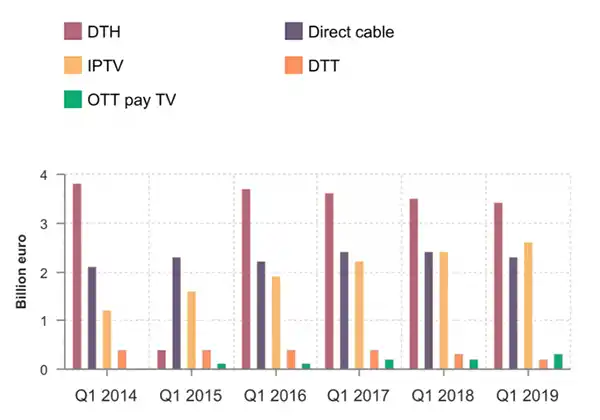Key Takeaway
- IPTV brings new possibilities to how one consumes media, offering features and flexibility that traditional cable cannot match but cable TV is still popular all over.
- Both services have their own pros when in terms of flexibility, interactivity, content delivery, and quality, hence preferred equally for specific reasons.
- Cable TV although has a wide broadcasting arena and doesn’t depend on the internet connection as IPTV connections but is fixed with content and channel options.
In television broadcasting, two primary contenders dominate the landscape: Internet Protocol Television (IPTV) and traditional cable TV. While both deliver entertainment to your living room, their operation is fundamentally different. These options are significantly picked by users all over the world and compete with each other in various aspects.
IPTV, a technology gaining traction, offers a new way of transmitting TV shows and movies over the internet. By using the same kind of technology that powers the internet, IPTV opens up new possibilities for how we consume media, offering features and flexibility that traditional cable cannot match.
However, with its widespread availability and consistent delivery, cable TV continues to hold its own in the broadcasting arena. Let’s delve deeper into these differences and understand what each brings.

Traditional cable TV operates on a broadcast model, where all content is sent simultaneously over a physical cable network. This means that all channels are transmitted at all times, and the viewer selects which one to watch by tuning their television to the desired channel. This is one of the significant reasons why major people pick his broadcasting option.
On the other hand, IPTV uses Internet Protocol (the same technology that powers the Internet) to deliver television programming. Instead of broadcasting all content at all times, IPTV operates on a ‘request’ model. When you select a program or channel, the IPTV server sends only that content to your television through your internet connection. This runs quickly and works under the user’s demand to give the best service.
One of the key differences between IPTV and cable lies in their level of flexibility and interactivity. IPTV, being an internet-based service, allows features such as live pause, video on demand, and even the ability to re-watch a show or movie that you missed. It also offers the potential for greater interactivity, such as personalized recommendations based on viewing habits.
Cable TV, while reliable and widespread, lacks these interactive features due to its broadcast nature. The content is fixed and scheduled by the cable provider, with less room for personalization or on-demand viewing. They have well-defined content options for viewers to get fixed with and this results in limited options to consider for entertainment or any other stuff.
Therefore, cable TV connections seem like a considerable option when looked at from the lenses of flexibility and interactivity. Still, people are picking both options as they seem comfortable with them. Well, as per the statistics, it is speculated that IPTV subscriptions in China will grow at a 2.4% CAGR from 2022 to 2027.
Do You Know: DTH cable remained the most-used technology for subscription TV in Europe by revenue, now its usage has remarkably declined.
In terms of content delivery and quality, both IPTV and cable have their strengths. Cable TV is less dependent on your internet connection, so it can often provide a more consistent viewing experience, especially if your internet service is slow or unreliable. Users do not have to wait for the right availability of any data connections or any other factor other than the cable set in the right order.
IPTV, however, can deliver a higher quality picture and sound, given a robust internet connection. It also has the potential to offer a wider range of channels and content, as it is not limited by the capacity of a physical cable network. Internet connection is the biggest factor that determines the quality of the content of IPTV, although they are believed to provide remarkable service with the help of an array of media channels or content options for the user itself.
While IPTV and cable TV both have their place in the broadcasting landscape, they offer different experiences to the viewer. IPTV, with its flexibility, interactivity, and potential for a wider range of content, represents the next step in the evolution of broadcasting. However, traditional cable TV continues to be a reliable choice for viewers who prefer a straightforward, consistent viewing experience.
As we move forward into the digital age, it’s clear that the world of television is changing. If it’s through IPTV or cable, the goal remains the same: to deliver quality content that entertains, informs, and inspires.